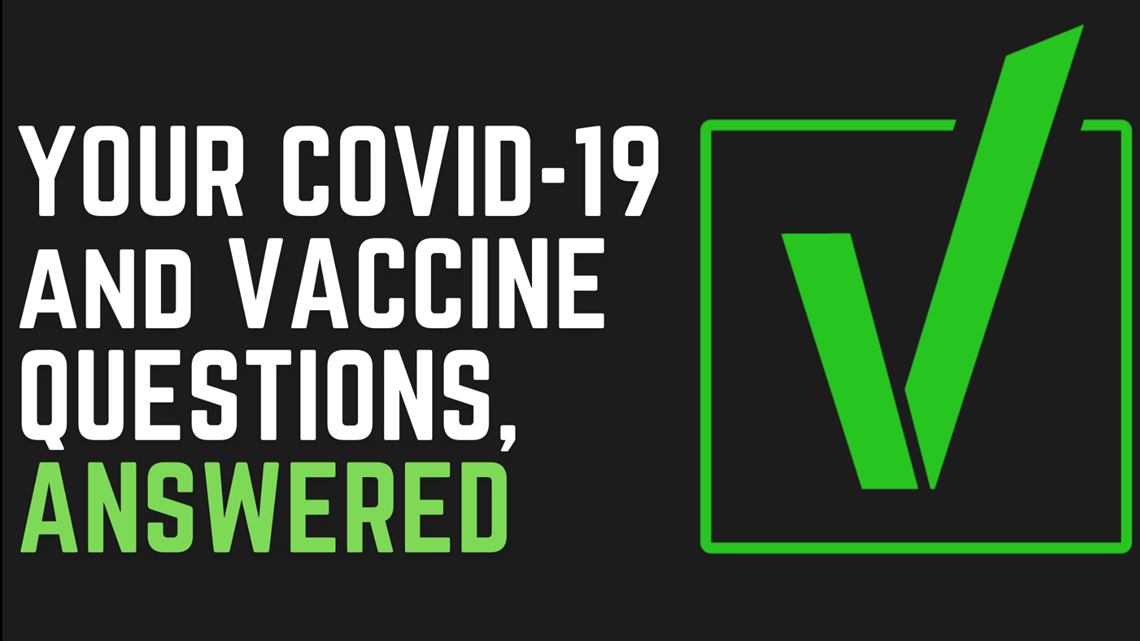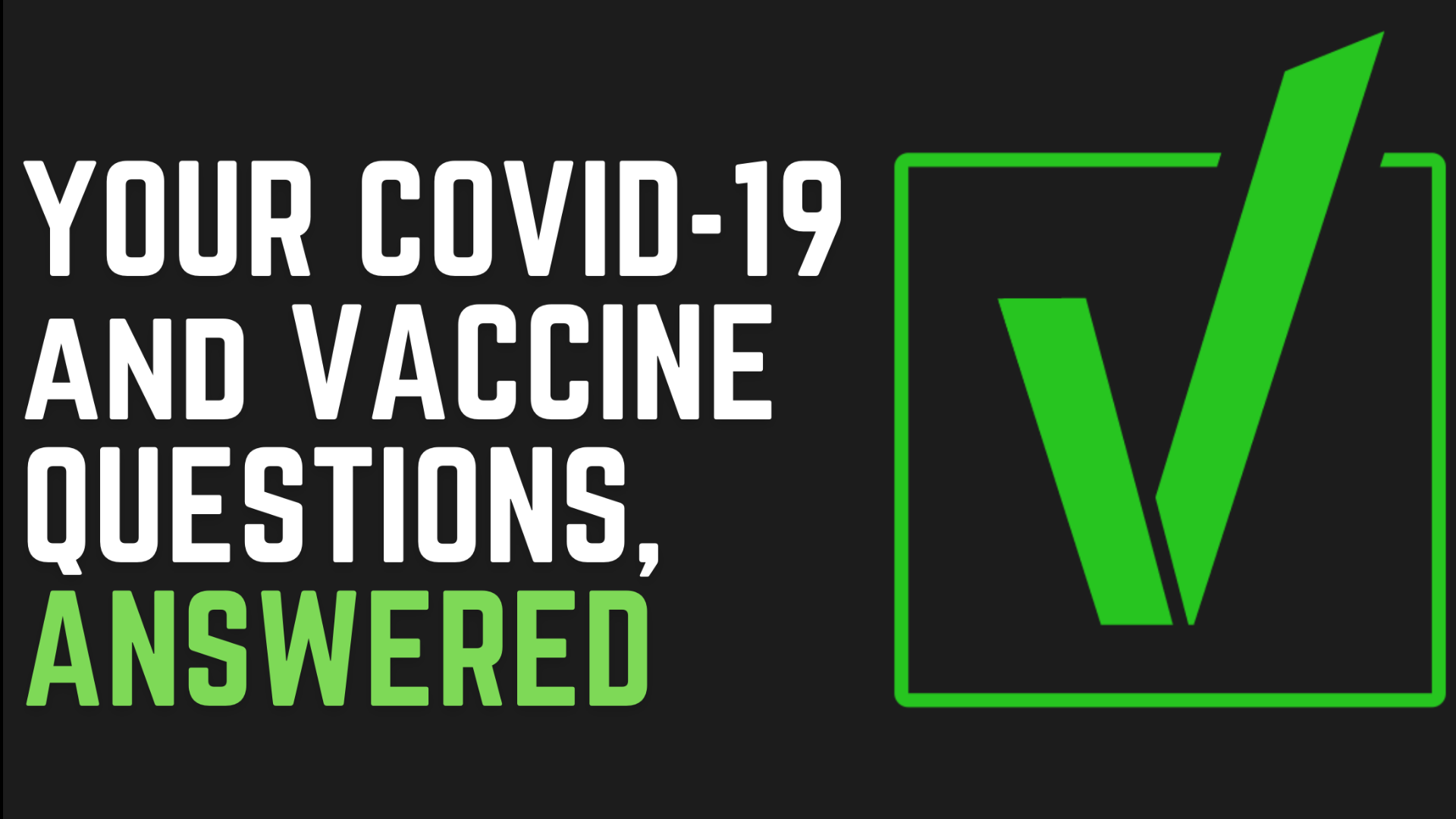WASHINGTON — March 5 marks the one-year anniversary of coronavirus hitting the DMV, and the Verify team has been busy getting you the answers.
We went straight to some of the top experts to answer the latest questions on vaccines and COVID-related questions, from distribution to common side effects.
To help sort through the misinformation, we brought those questions to five infectious disease experts on a roundtable discussion.
MEET THE EXPERTS:
- Dr. Namandje Bumpus, Director and professor, Department of Pharmacology and Molecular Sciences at Johns Hopkins University
- Dr. Linda Nabha, Infectious Disease Expert with the University of Pittsburgh
- Dr. William Schaffner, Professor, Division of Infectious Diseases at Vanderbilt University
- Dr. Gigi Gronvall, Immunologist and Associate Professor of Environmental Health and Engineering at Johns Hopkins University
- Dr. Stephen Kissler- Postdoctoral Research Fellow in the Department of Immunology and Infectious Diseases at the Harvard T.H. Chan School of Public Health
You watch the full discussion here:
We asked our experts: What do you think is the most harmful or pervasive piece of misinformation about COVID-19?
Dr. Bumpus: "That the COVID-19 vaccines are dangerous and were developed too quickly to be trusted."
Dr. Schaffner: "The most harmful piece of misinformation about COVID-19 is that it will just 'disappear.'"
Dr. Kissler: "The variations on "it's just the flu". Like all the most effective pieces of misinformation, this idea has been especially difficult to combat because it's partially true: COVID-19 is a seasonal respiratory virus that shares many clinical and epidemiological features with influenza, yet certain key differences, including its increased transmissibility and its increased severity, have made it a much more formidable enemy than seasonal influenza."
Dr. Gronvall: "That masks don’t work or that the virus doesn’t kill."
Dr. Nabha: "With Johnson & Johnson rollout of single shot, there is building concern that this is a second tier vaccine (which of course its not!)"


VACCINE QUESTIONS, ANSWERED:
GETTING THE VACCINE:
What are the three main vaccines on the market right now?
The three main vaccines currently in operation are Pfizer-BioNTech, Moderna and Johnson & Johnson. The Johnson & Johnson vaccine only requires one dose, while Pfizer and Moderna require second dosages.
Want more on the differences between the three and their efficacy rates? Click here.
Should you get the vaccine if you've already been sick with COVID-19?
The CDC says in the third section on their COVID-19 vaccine facts page that you should still get the vaccine even if you’ve already had COVID-19 and recovered.
The agency says that experts do not know how long someone is immune from getting sick again after recovering from the virus and that some early evidence may suggest it doesn’t last very long. They also don’t know how long immunity from vaccinations will last until they have more data.
What are the common side effects?
The most common COVID-19 vaccine side effects are:
- Pain at the injection site
- Tiredness
- Headache
- Muscle pain
- Chills
- Joint pain
- Swollen lymph nodes in the same arm as the injection
- Nausea and vomiting
- Fever
Can you get one dose of one vaccine and then switch to a different type of vaccine for your second dose?
Our experts all agree -- do NOT mix and match the dosages. Stick with your prescribed vaccine and make sure to follow the proper timing between your first and second dosages. These vaccines dosages were made to be followed for their own brand, and act as a sort of "booster shot" to the first dose.
The CDC website agrees: “COVID-19 vaccines are not interchangeable with each other or with other COVID-19 vaccine products. The safety and efficacy of a mixed-product series have not been evaluated. Both doses of the series should be completed with the same product.”
What happens if you miss your second dose?
According to Dr. Kawsar Talaat, an infectious disease expert and vaccine researcher at Johns Hopkins, there’s little risk in “waiting too long,” because the first dose of the vaccine causes the body to start building immunity.
The Centers for Disease Control and Prevention recommends that the second dose of vaccines be administered within three weeks to one month, but stated that “there is no maximum interval between the first and second doses for either vaccine.”
Dr. Nabha said, "It's bound to happen, and we know some people might miss their vaccine, but the CDC still says to get that vaccine as soon as you can."
How can we trust a one dose vaccine like Johnson & Johnson when we have been told that doubling up is more safe?
Our experts all agreed that Johnson & Johnson's one dose was "just as safe and effective" as the two dosages -- simply put, it wouldn't have been authorized from the FDA for emergency use if there were issues.
Dr. Bumpus said Johnson & Johnson isn't the same type of vaccine as Pfizer and Moderna, but that doesn't mean it's less effective, just different.
"It prevented hospitalizations, it's prevented death, and a substantial in decrease in sevre cases, and still effective in mild cases," she said. "We can't compare numbers directly -- they were on at different times at diffetrent locations. They work different ways, but they still work effectively. I wouldn't make the comparison, because they are different vaccines from one another but they are all very much for use.
Dr. William Schaffner agreed. "They're all in the same ballpark in terms of effectiveness and safety. I actually know what the best vaccine is -- the best vaccine is the one available to you, today!"
RELATED: VERIFY: Explaining how the Johnson & Johnson vaccine works and what makes it different from others
Is the vaccine free?
While COVID-19 tests can range in price depending on what type of provider and what type of test you're taking, the COVID-19 vaccines themselves won't cost you money.
Both the Centers for Medicare and Medicaid Services and the CDC confirm you don't have to pay for any of the vaccines on the market, thanks to stipulations laid out in the CARES Act legislation this past spring.
The legislation protects insurers from applying what's known as "cost-sharing", aka co-payments and deductibles from occurring. It also helps protect doctors and pharmacies from billing patients for the costs, even if you might not have health insurance.
Another layer of protection: the CDC also mandates that vaccine providers must sign a "COVID-19 Vaccination Program Provider Agreement", which states they must not bill patients for the vaccines and the cost of administering them. It's an added layer of protection.
If the vaccine is free, why am I being asked to show an insurance card?
While you won't have to pay out of pocket, you might be asked for insurance information when you register for a vaccine appointment. But why?
"The federal government is providing the vaccine free of charge to people living in the United States," writes the CDC on their COVID-19 vaccine commonly asked questions list. " However, your vaccination provider may bill your insurance company, Medicaid, or Medicare for an administration fee. Vaccination providers can be reimbursed for this by the patient’s public or private insurance company or, for uninsured patients, by Provider Relief Fund. No one can be denied a vaccine if they are unable to pay the vaccine administration."
Even so, if you get a vaccine shot from your doctor or places like urgent care, make sure to double-check with your provider about other fees they might charge outside of administering the shot.
AFTER THE VACCINE:
Do you need to avoid alcohol after receiving the vaccine?
No. There is no evidence to show that alcohol consumption will have an effect on how the vaccine works. The FDA's vaccination guidance for the Pfizer, Moderna and Johnson & Johnson vaccines does not mention alcohol.
"I'm sure many people in the trials had a glass of wine, and maybe three during dinner. So that wasn't monitored," Dr. William Schaffner says. "There's no reason to believe from studying any other vaccine, that alcohol itself will somehow impair your immune response."
Dr. William Moss agrees: "Excessive alcohol consumption is bad for many reasons, but casual or moderate alcohol consumption will not impact the response to COVID-19 vaccines."
Do anti-inflammatory drugs like aspirin, ibuprofen or acetaminophen reduce the effectiveness of the COVID-19 vaccine?
Yes, according to Dr. Anita Gupta at Johns Hopkins University School of Medicin -- taking anti-inflammatory medication before getting the COVID-19 vaccine could reduce the vaccine’s effectiveness.
But after you’ve received the vaccine it should be OK to take these drugs to ease any side effects or pain at the injection site.
And talk to your doctor before you stop taking any medication you take normally.
When you've been vaccinated, do you still need to quarantine after contact with someone who has COVID-19?
The CDC says you can avoid quarantining after known contact if you fulfill three criteria:
- It’s been at least two weeks since your final vaccine dose,
- It’s been no longer than 90 days since your final dose,
- And you have no symptoms.
The CDC told the Verify team that these criteria are subject to change as they learn more about the long term efficacy of the vaccines on the market.
HOW TO ASK MORE VACCINE QUESTIONS: Have questions? Text the Verify team at 202-895-5599 or shoot us an email at VERIFY@WUSA9.COM. You can also fill out the contact form below which goes straight to the Verify team.


